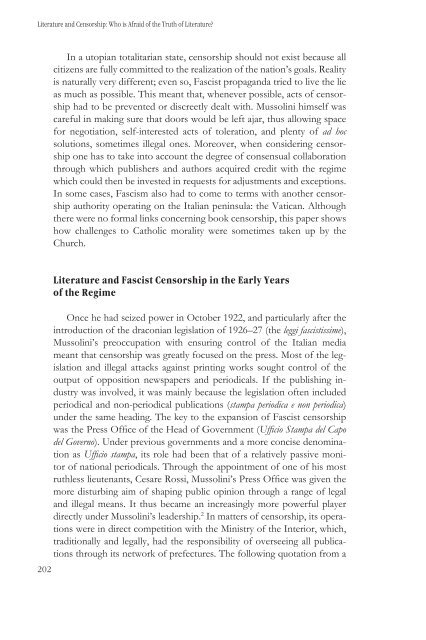Literatura in cenzura - Društvo za primerjalno književnost - ZRC SAZU
Literatura in cenzura - Društvo za primerjalno književnost - ZRC SAZU
Literatura in cenzura - Društvo za primerjalno književnost - ZRC SAZU
- No tags were found...
You also want an ePaper? Increase the reach of your titles
YUMPU automatically turns print PDFs into web optimized ePapers that Google loves.
Literature and Censorship: Who is Afraid of the Truth of Literature?In a utopian totalitarian state, censorship should not exist because allcitizens are fully committed to the reali<strong>za</strong>tion of the nation’s goals. Realityis naturally very different; even so, Fascist propaganda tried to live the lieas much as possible. This meant that, whenever possible, acts of censorshiphad to be prevented or discreetly dealt with. Mussol<strong>in</strong>i himself wascareful <strong>in</strong> mak<strong>in</strong>g sure that doors would be left ajar, thus allow<strong>in</strong>g spacefor negotiation, self-<strong>in</strong>terested acts of toleration, and plenty of ad hocsolutions, sometimes illegal ones. Moreover, when consider<strong>in</strong>g censorshipone has to take <strong>in</strong>to account the degree of consensual collaborationthrough which publishers and authors acquired credit with the regimewhich could then be <strong>in</strong>vested <strong>in</strong> requests for adjustments and exceptions.In some cases, Fascism also had to come to terms with another censorshipauthority operat<strong>in</strong>g on the Italian pen<strong>in</strong>sula: the Vatican. Althoughthere were no formal l<strong>in</strong>ks concern<strong>in</strong>g book censorship, this paper showshow challenges to Catholic morality were sometimes taken up by theChurch.202Literature and Fascist Censorship <strong>in</strong> the Early Yearsof the RegimeOnce he had seized power <strong>in</strong> October 1922, and particularly after the<strong>in</strong>troduction of the draconian legislation of 1926–27 (the leggi fascistissime),Mussol<strong>in</strong>i’s preoccupation with ensur<strong>in</strong>g control of the Italian mediameant that censorship was greatly focused on the press. Most of the legislationand illegal attacks aga<strong>in</strong>st pr<strong>in</strong>t<strong>in</strong>g works sought control of theoutput of opposition newspapers and periodicals. If the publish<strong>in</strong>g <strong>in</strong>dustrywas <strong>in</strong>volved, it was ma<strong>in</strong>ly because the legislation often <strong>in</strong>cludedperiodical and non-periodical publications (stampa periodica e non periodica)under the same head<strong>in</strong>g. The key to the expansion of Fascist censorshipwas the Press Office of the Head of Government (Ufficio Stampa del Capodel Governo). Under previous governments and a more concise denom<strong>in</strong>ationas Ufficio stampa, its role had been that of a relatively passive monitorof national periodicals. Through the appo<strong>in</strong>tment of one of his mostruthless lieutenants, Cesare Rossi, Mussol<strong>in</strong>i’s Press Office was given themore disturb<strong>in</strong>g aim of shap<strong>in</strong>g public op<strong>in</strong>ion through a range of legaland illegal means. It thus became an <strong>in</strong>creas<strong>in</strong>gly more powerful playerdirectly under Mussol<strong>in</strong>i’s leadership. 2 In matters of censorship, its operationswere <strong>in</strong> direct competition with the M<strong>in</strong>istry of the Interior, which,traditionally and legally, had the responsibility of oversee<strong>in</strong>g all publicationsthrough its network of prefectures. The follow<strong>in</strong>g quotation from a
















